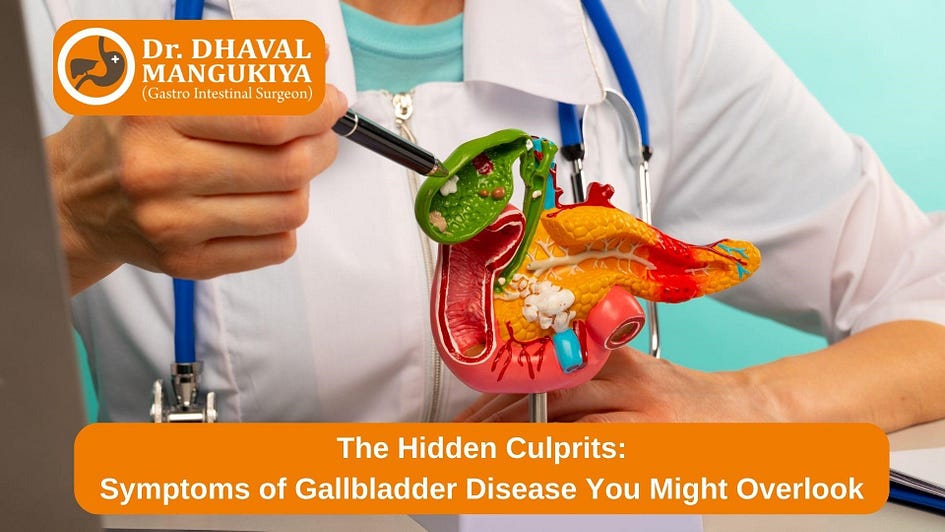The Hidden Culprits: Symptoms of Gallbladder Disease You Might Overlook

Gallbladder disease often stealthily manifests itself, masquerading as unrelated symptoms that individuals may dismiss or overlook. Understanding these subtle indicators can be pivotal in timely diagnosis and treatment. Being one of the best gallbladder surgeons in Surat, Dr Dhaval Mangukiya sheds light on symptoms of gallbladder disease that might go unnoticed with the intention of empowering individuals to recognize the signs and seek appropriate medical attention.
1. Unexplained Abdominal Pain:
Abdominal pain is a hallmark symptom of gallbladder disease, but its presentation can be deceiving. Rather than sharp, localized pain in the right upper quadrant, some individuals may experience dull, intermittent discomfort in the upper abdomen or between the shoulder blades. This pain may come and go, making it easy to dismiss or attribute to other causes.
2. Digestive Distress:
Gallbladder disease can wreak havoc on digestive function, leading to symptoms such as bloating, gas, indigestion, and nausea. Dr Dhaval, known as one of the best laparoscopic surgeons in Surat, says that these symptoms often arise after consuming fatty or greasy foods, as the gallbladder struggles to release bile efficiently to aid in digestion. Over time, recurrent digestive distress may become a recurring nuisance, impacting one’s quality of life.
3. Unpredictable Bowel Habits:
Changes in bowel habits, including diarrhoea or constipation, can be subtle indicators of gallbladder dysfunction. The gallbladder plays a crucial role in bile storage and release, which aids in the digestion and absorption of fats. When impaired, irregularities in bowel movements may ensue, leaving individuals perplexed by sudden shifts in their gastrointestinal patterns.
4. Intolerance to Certain Foods:
Gallbladder disease can heighten sensitivity to specific foods, particularly those high in fat content. Individuals may notice discomfort, bloating, or nausea after consuming fatty or greasy meals, prompting them to avoid such foods altogether. While dietary modifications may provide temporary relief, addressing the underlying gallbladder dysfunction is essential for long-term symptom management.
5. Recurrent Heartburn or Acid Reflux:
Persistent heartburn or acid reflux may be more than just a nuisance; it could be a subtle clue pointing to gallbladder disease. As bile refluxes into the stomach due to impaired gallbladder function, it can irritate the lining of the esophagus, leading to symptoms of gastroesophageal reflux disease (GERD). Identifying the underlying cause is crucial for effectively managing reflux symptoms and preventing complications.
6. Unexplained Weight Loss:
Unintentional weight loss is often a red flag for underlying medical conditions, including gallbladder disease. As the body struggles to digest and absorb fats properly, individuals may experience gradual weight loss despite maintaining their usual dietary habits. This weight loss may be subtle at first but can become more pronounced over time if left untreated. It is imperative to consult the best gastro-intestinal surgeon in Surat in case a family member has such weight-loss.
7. Jaundice:
While less common, jaundice can occur in cases of severe gallbladder disease or when gallstones obstruct the bile duct. Jaundice presents as yellowing of the skin and eyes due to elevated levels of bilirubin in the bloodstream. It is essential to seek immediate medical attention if jaundice develops, as it may indicate a serious complication requiring urgent intervention.
8. Shoulder or Back Pain:
Surprisingly, gallbladder disease can manifest as referred pain in areas seemingly unrelated to the abdomen. The best gastro surgeons in Surat have treated patients for gallbladder related issues with symptoms such as discomfort or pain in the right shoulder or upper back. This phenomenon, known as referred pain, can be perplexing but serves as a valuable clue in diagnosing gallbladder-related issues.
9. Fatigue and Weakness:
Chronic gallbladder disease can take a toll on overall health and well-being, leading to fatigue, weakness, and lethargy. As the body struggles to digest and absorb nutrients properly, individuals may experience decreased energy levels and diminished physical stamina. Addressing gallbladder dysfunction is essential for restoring vitality and improving quality of life.
Conclusion:
Gallbladder disease is a stealthy adversary, often disguising itself behind seemingly unrelated symptoms. From unexplained abdominal pain and digestive distress to changes in bowel habits and intolerance to certain foods, the signs of gallbladder dysfunction can be subtle yet significant. Recognizing these symptoms is crucial for seeking timely medical evaluation. Don’t ignore the whispers of your body; they may be signalling a deeper issue that warrants attention.
Comments
Post a Comment